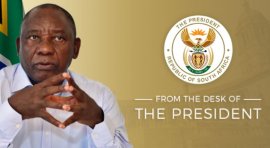
In considering the relevance of Steve Biko’s life and legacy, President Cyril Ramaphosa has recalled his call to the people to be architects of their own liberation.
In his weekly newsletter to the nation, President Ramaphosa emphasised that this call is as important now as it was back then.
Today - 12 September 2022- marks the 45th anniversary of the death of Stephen Bantu Biko in detention at the hands of the apartheid regime.
“We must be focused on addressing our challenges to achieve a truly free and equal society. We each need to play our part by using the foundational rights in our Constitution to build a South Africa free of poverty and hunger, underdevelopment, crime and violence.
“As Steve Biko urged, let us march forth with courage and determination on our common quest for true humanity,” the President said.
South Africa he said, has come a long way towards the fulfilment of human dignity, the principle that Biko so cherished, but still has much further to go.
“Without a job, without a house, electricity or running water, without land, without skills or opportunities, millions of South Africans are still deprived of the lives they seek and deserve.
“That is why government is working with social partners to build an inclusive economy, create employment, enable businesses to thrive and tackle poverty and hunger.”
The President said it remains a source of sorrow that Biko was just 30 years old when he died.
He said that Biko was cut down in his prime by those who feared the power and resonance of his ideas of self-liberation and his efforts to infuse black men and women with pride and dignity.
“When we won our freedom in 1994, we understood that the right to vote was just one part of our struggle for human dignity.
“Twenty-eight years into our democracy, we are confronted with many challenges, such as poverty, unemployment and inequality. As a result, we often lose sight of how far we have come in giving effect to the principles on which our Constitution is founded and that anchored Steve Biko’s thought and teachings,” he said.
In South Africa today, government continues to work to fulfil the basic rights of every South African “so that they may lead quality lives free of disease, hunger and deprivation”.
The President highlighted that successive democratic administrations have implemented policies to salvage the lost dignity of this country’s majority by providing education, healthcare, housing and basic services.
“In South Africa today, a decent education is a fundamental right. The state invests in early childhood development, in supporting learning outcomes for our youngest citizens, and provides social relief through school feeding programmes to ensure young learners achieve the best outcomes possible,” he said.
Through the National Student Financial Aid Scheme and various other forms of state support, thousands of young South Africans from poor backgrounds have been able to become doctors, lawyers, teachers, scientists, artisans and entrepreneurs.
The President added that government supports poor and vulnerable citizens through an extensive social safety net and provides work opportunities through mass public employment programmes. – SAnews.gov.za


